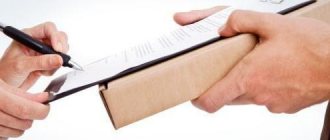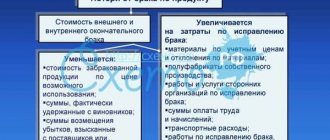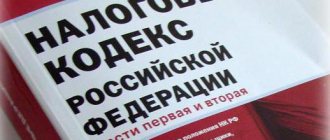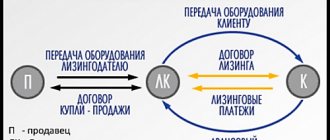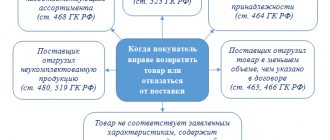Home — Articles
Returning goods is fraught with accounting difficulties. And everyone tries to avoid them. It's good if your customer returned the item quickly, while you can still delete the shipping data in your accounting without consequences. In this case, many (by agreement with the counterparty) simply destroy the shipping documents - and it’s as if the shipment never happened at all. And if the buyer returns only part of the goods, then a new invoice and invoice are issued only for those goods that remain with the buyer.
But this cannot always be done. You will then have to account for this return. The main catch is that for VAT purposes and for income tax purposes, the procedure for processing return transactions recommended by regulatory authorities is different. Moreover, no matter what goods are returned - high-quality or not.
Return of goods in 2020-2021
So, from 2021, VAT when returning goods to the supplier is required to be processed according to the following rules:
- The seller prepares an adjustment invoice and records it in the purchase ledger.
- The buyer no longer draws up an invoice, but registers the seller’s adjustment invoice in the sales book (if he managed to accept VAT for deduction, if not, then he accepts the deduction in the non-refundable part).
It does not matter for what reason the return occurs. This is how the return of both defective and high-quality goods is processed if it does not comply with the contract. If you issue a return with an invoice from the buyer (as was done previously, until 2021), the seller will lose the VAT deduction. The same procedure applies if the buyer does not pay VAT due to the use of a special regime (USN, UTII).
ConsultantPlus experts spoke about VAT deductions from the seller when returning goods. Study the material by getting trial access to the K+ system for free.
Such clarifications are provided by the Ministry of Finance (you can view the details of the letters using the links above). But at the same time, he makes the following addition: if the goods are returned under a purchase and sale agreement, where the parties change places, invoices are issued as for sales (see, for example, letters of the Ministry of Finance dated May 15, 2019 No. 03-07-09/34582, No. 03-07-09/34591).
Read more about issuing return invoices in this article.
simplified tax system
For the purposes of calculating the single tax, the procedure for reflecting the return of finished products depends on two factors:
- whether the ownership of the product has passed to the buyer;
- whether the buyer paid for the returned products.
If by the time of return the product has become the property of the buyer, the organization, when accepting the product back, receives it as a receipt of materials or goods, depending on the nature of its further use (for resale or use in its activities).
Organizations that pay a flat tax on the difference between income and expenses can include the cost of returned products as expenses. Evaluate the returned products in the amount of real costs associated with their production (letters of the Ministry of Finance of Russia dated June 16, 2011 No. 03-03-06/1/351, Federal Tax Service of Russia dated July 17, 2009 No. 3-2-06/77) . Despite the fact that these letters are addressed to income tax payers, they can also be used by organizations that apply the simplified tax system (Clause 2 of Article 346.16 of the Tax Code of the Russian Federation).
Write off expenses as follows:
- if the organization has recorded the return as materials, it can take their cost into account after transferring money to the buyer for the returned products. For some types of materials, costs can be taken into account if two conditions are simultaneously met: transfer of money to the buyer and transfer of money to production (operation). Reason – subparagraph 1 of paragraph 2 of Article 346.17 of the Tax Code of the Russian Federation;
- if an organization has capitalized the return as goods and plans to sell them, it can take into account the cost of the goods in expenses if two conditions are simultaneously met: after they are sold and money is transferred to the buyer for the returned products (subclause 2, clause 2, article 346.17 of the Tax Code of the Russian Federation).
There are no VAT consequences when returning products are accepted for registration.
If the buyer does not pay for the products for which he subsequently received ownership, the refund will not affect the calculation of the single tax (clause 1 of Article 346.17 of the Tax Code of the Russian Federation).
If the ownership of the sold products has not passed to the buyer and payment for it has not been received, then the return of the products does not affect the calculation of the single tax (regardless of the object of taxation). This is due to the fact that organizations using the simplification recognize revenue in the reporting period in which payment for sold products is received (clause 1 of Article 346.17 of the Tax Code of the Russian Federation).
If the sold products have been paid for by the buyer, but ownership has not yet transferred, then when returning such products, it is necessary to adjust the income. In the reporting period in which the money for the products will be returned to the buyer, make changes to the book of income and expenses, reflecting income with a minus sign. This follows from the provisions of paragraph 1 of Article 346.17 of the Tax Code of the Russian Federation.
UTII
The object of UTII taxation is imputed income for a specific type of activity of the organization (clauses 1 and 2 of Article 346.29 of the Tax Code of the Russian Federation). Therefore, the return of products does not affect the determination of the tax base for UTII (for example, in public catering).
When the return will be a reverse implementation
As a rule, when returning goods, no one enters into a separate purchase and sale agreement, in which the buyer becomes the seller and the seller becomes the buyer. Therefore, it is not easy to immediately imagine the situation that the Ministry of Finance is talking about.
But even if there is no such agreement, reverse implementation may occur. Look carefully at the original contract. Does it contain a condition on the repurchase of goods by the seller? For example, if the buyer was unable to sell them before a certain time. This is the reverse implementation, in which the buyer must create an invoice.
The next point is important here. To avoid claims for deduction, the contract should clearly state that the return of the goods is carried out by return delivery, in which the buyer is the seller and the seller is the buyer. Then the inspectors will have no reason to find fault with the invoice (it will not be an adjustment, but a regular one). If there is no such specificity in the contract, claims are possible against any execution of the transaction:
- You made an adjustment invoice, and the tax office says: “You have a buyback, you need an invoice from the buyer” - and removes the deduction.
- Or, on the contrary, you have issued a return delivery, and the controllers tell you: “You don’t have anything written about return delivery, it says about a return” - and you also lose your deduction and are forced to go to court.
So review your contracts and make changes if necessary.
By the way, buyback is possible not only for unsold quality goods, but also for defective ones (letters from the Ministry of Finance dated May 15, 2019 No. 03-07-09/34582, No. 03-07-09/34591).
BASIC: income tax
Reflection of income and expenses associated with the return of finished products depends on the moment of transfer of ownership of the finished product to the buyer and the tax accounting method used.
If an organization uses the accrual method and the buyer returns products that have become his property, for tax purposes, conduct this as a “reverse sale” (letter of the Ministry of Finance of Russia dated May 24, 2006 No. 03-03-04/1/475, Federal Tax Service of Russia on Moscow dated April 19, 2007 No. 19-11/036207). Whether the product was paid for or not does not matter.
Receive the product back from the buyer as a receipt of goods or materials, depending on the nature of its further use (for resale or use in your business). Evaluate the returned products in the amount of real costs associated with the production of these products (letters of the Ministry of Finance of Russia dated June 16, 2011 No. 03-03-06/1/351, Federal Tax Service of Russia dated July 17, 2009 No. 3-2-06/77 ). This cost, in turn, will be taken into account as expenses when calculating income tax not at the time of acquisition, but at the time:
- sales of finished products, the cost of which includes returned values, if the organization capitalized the return as materials and used them in the production of finished products (paragraph 2, clause 2, article 318 of the Tax Code of the Russian Federation);
- sales of goods, if the organization has capitalized the return as goods and plans to sell them (paragraph 2 of article 320 of the Tax Code of the Russian Federation).
If an organization uses the accrual method and the buyer returns products that have not yet become his property, then “reverse sale” does not occur (Clause 1 of Article 39 of the Tax Code of the Russian Federation). After all, the seller remained the owner of the product. Therefore, for the selling organization, the return of products will not affect the tax base in any way - income and expenses will be taken into account based on the actual quantity of products sold (i.e., the cost of the returned products will not be taken into account) (Clause 1, Article 248, Clause 1, Art. 252 of the Tax Code of the Russian Federation). This rule applies if the buyer has grounds for returning the product at the time of its acceptance (i.e., in fact, the buyer did not accept the product and did not receive it) or the contract was canceled at the time of conclusion (due to inadequate quality of the goods).
If the contract was canceled at the time of conclusion, and the seller has not yet reported VAT and income tax for the period of shipment, the revenue and cost of acquisition will be indicated in the declarations based on the actual quantity of products sold (i.e., the cost of returned products will not be taken into account). Otherwise, in order to return overpaid VAT and income taxes from the budget, the supplier of low-quality products will have to submit updated tax returns for the period in which the shipment occurred.
Situation: how, when calculating income tax, to reflect the return by the buyer of finished products, the ownership of which has not been transferred to him? According to the agreement, ownership passes on the date of payment. The organization uses the accrual method.
The return of finished products will not affect income and expenses in tax accounting.
If ownership of the product has not yet been transferred to the buyer (no payment has been received), the return of finished products will not affect income and expenses in tax accounting - income and expenses will be taken into account based on the actual quantity of products sold (i.e., the cost of returned products will not be taken into account will be) (clause 1 of article 248 and clause 1 of article 252 of the Tax Code of the Russian Federation).
A different tax accounting procedure applies if the organization uses the cash method. In this case, the reflection of the return for tax purposes depends on whether the buyer has received payment for the product at the time of its return or not.
If payment has not been received from the buyer, then the return of the product does not affect the calculation of the tax base using the cash method of tax accounting. This is due to the fact that organizations using this method recognize revenue in the reporting period in which payment for sold products is received (clause 2 of Article 273 of the Tax Code of the Russian Federation).
If by the time the product is returned, payment has been received from the buyer, then for profit tax purposes a “reverse sale” occurs. In this case, income and expenses for this operation are taken into account in the same way as under the accrual method, but provided that the organization returned the money for the products received back to the buyer (clauses 2 and 3 of Article 273 of the Tax Code of the Russian Federation).
If by the time the product is returned, payment has been received from the buyer, but ownership has not been transferred to it, “reverse sale” does not occur (Clause 1 of Article 39 of the Tax Code of the Russian Federation). In this case, return the received advance back to the buyer and reduce income by its amount (clause 2 of article 249, article 41 of the Tax Code of the Russian Federation). The selling organization does not take into account the costs associated with the sale of this batch of products, since it still remains its owner (clause 3 of Article 273, clause 1 of Article 253 of the Tax Code of the Russian Federation).
Situation: how to take into account the repurchase of expired products and their disposal (destruction) when taxing? The condition for the return of expired goods is provided in the contract with the buyer. The organization applies a general taxation system.
When calculating income tax, expenses for the repurchase of expired products and their disposal (destruction) can be taken into account if this is provided for by law.
The costs of repurchase of expired products and their disposal (destruction) do not meet the criterion of economic justification (clause 1 of Article 252 of the Tax Code of the Russian Federation). An operation in which an organization, by agreement with the buyer, buys back its expired product constitutes a sale of goods (Clause 1, Article 39 of the Tax Code of the Russian Federation). In this case, the original seller becomes the buyer, and the original buyer becomes the seller. Since actually damaged goods are accepted at the same price at which they were sold, regulatory agencies believe that this price is inflated. Consequently, the costs associated with the “reverse” acquisition of goods, as well as further costs for their disposal (destruction), cannot be considered economically justified. And unreasonable expenses do not reduce the tax base for income tax (clause 1 of Article 252 of the Tax Code of the Russian Federation).
An exception to this rule is the case when the obligation for the supplier to buy back expired products is expressly provided for by law. For example, such an obligation is established in relation to suppliers of bread and bakery products (clause 3.11.8 of SanPiN 2.3.4.545-96, approved by Resolution of the State Committee for Sanitary and Epidemiological Supervision of the Russian Federation dated September 25, 1996 No. 20). In this situation, the costs of repurchase of expired products and their disposal (destruction) are economically justified. If there is documentary evidence of them, as well as a buyback clause in the contract with the buyer, the supplier organization has the right to take such costs into account when calculating income tax (clause 1 of Article 252, subclause 49 of clause 1 of Article 264 of the Tax Code of the Russian Federation).
Similar clarifications are contained in letters of the Ministry of Finance of Russia dated May 22, 2014 No. 03-03-06/1/24238, dated September 10, 2012 No. 03-03-06/1/479, dated September 14, 2010 No. 03- 03-06/1/587, dated September 6, 2010 No. 03-03-06/1/580.
Advice : there are arguments that allow an organization to take into account the costs of repurchasing expired products and their disposal (destruction) when calculating income tax. Even if the law does not provide for the obligation for the supplier to buy back expired goods. They are as follows.
By purchasing expired goods from buyers, the selling organization fulfills its contractual obligations (Clause 4 of Article 421, Articles 309, 310 of the Civil Code of the Russian Federation).
Refusal to comply with them is fraught with penalties (the amount of which may be comparable to the costs incurred) (Articles 393, 394 of the Civil Code of the Russian Federation) and loss of attractiveness for buyers. Moreover, by refusing to buy back such goods, the organization may cease its business activities altogether. After all, many business partners do not agree to enter into contracts on other terms.
After purchasing expired products, the organization is obliged to recycle (destroy) them. Such products are of low quality and are subject to withdrawal from circulation. For example, in relation to food products, perfumery and cosmetic products, this requirement is provided for in paragraphs 2, 4 and 18 of the Regulations approved by Decree of the Government of the Russian Federation of September 29, 1997 No. 1263. After conducting an examination of products withdrawn from circulation, the organization can take into account the costs for the disposal of expired products on the basis of subparagraph 49 of paragraph 1 of Article 264 of the Tax Code of the Russian Federation (letter of the Federal Tax Service of Russia for Moscow dated April 18, 2008 No. 20-12/037680).
From this point of view, the expenses in question are necessary for the activities of the organization and this is where their economic justification is manifested (clause 1 of Article 252 of the Tax Code of the Russian Federation).
However, the organization will most likely have to defend this point of view in court.
In arbitration practice there are examples of court decisions that set out this position (see decisions of the FAS Moscow District dated April 3, 2012 No. A40-44303/11-116-125, Volga District dated December 6, 2005 No. A55-2176/ 05-10). In particular, the courts note that expenses can be considered economically justified, even if they themselves do not bring a specific return. The main thing is that in general they are necessary to ensure activities aimed at generating income. In addition, the proposed approach is consistent with the position of the Constitutional Court of the Russian Federation, according to which the validity of expenses recognized for tax purposes cannot be assessed from the standpoint of their expediency, rationality, efficiency or the result obtained (decision of the Constitutional Court of the Russian Federation of June 4, 2007 No. 320- O-P and No. 366-O-P).
Do not deduct input VAT on expired products that were purchased from the buyer. This is due to the fact that the organization buys it not for resale or recycling, but for disposal (write-off, destruction). This transaction is not subject to VAT. Consequently, one of the conditions necessary for accepting input VAT for deduction is not met (clause 2 of Article 171 of the Tax Code of the Russian Federation). This procedure applies regardless of whether the obligation to repurchase damaged products is established by current legislation (agreement with the buyer) or not. Similar explanations are contained in the letter of the Ministry of Finance of Russia dated September 14, 2010 No. 03-03-06/1/587.
At the same time, the amount of input VAT increases the cost of expired products (clause 2 of Article 170 of the Tax Code of the Russian Federation). Therefore, it will be taken into account as part of tax expenses in the case where the obligation for the supplier to buy back expired products is expressly provided for in the legislation (clause 1 of Article 252 of the Tax Code of the Russian Federation).
An example of reflection in accounting and taxation of the return of finished products by the buyer in cases provided for by law. Ownership of the product is transferred to the buyer
LLC "Proizvodstvennaya" is engaged in the production of awning materials. One of the organization’s clients is Torgovaya LLC. In accordance with the purchase and sale agreement, Master supplies products to Hermes on a monthly basis, while Hermes makes an advance payment towards future deliveries.
In March, in accordance with the agreement, Hermes transferred an advance in the amount of 59,000 rubles. (including VAT – 9000 rubles). On April 15, Master shipped products worth RUB 118,000 to Hermes. (including VAT – 18,000 rubles). The cost of production was 65,000 rubles.
Some of the products turned out to be of poor quality because the packaging was damaged. The fact of detection of low-quality products was revealed after the goods were accepted for registration. On April 22, Hermes returned the defective product to the supplier. The cost of the returned products was 23,600 rubles. (including VAT - 3600 rubles).
Since at the time of return the products were already the property of Hermes, he formalized the receipt of the goods with an obligation to return the money previously received. At the same time, he issued an invoice in form No. TORG-12, a statement and an invoice, which he handed over along with the returned goods to the “Master”.
The “master” took into account the returned property as materials (later they will be used in the production of awning structures for summer cafes). The cost of the products that were returned by Hermes is 13,000 rubles. The amount of the advance payment based on the agreement is counted against future payments.
In accounting, the “Master” accountant reflected these transactions as follows.
In March:
Debit 51 Credit 62 subaccount “Settlements on advances received” – 59,000 rubles. – an advance was received from Hermes for the upcoming delivery of products;
Debit 76 subaccount “Calculations for VAT on advances received” Credit 68 subaccount “Calculations for VAT” - 9,000 rubles. (RUB 59,000 × 18/118) – VAT is charged on the prepayment amount.
April 15:
Debit 62 Credit 90-1 – 118,000 rub. – revenue from sales of products is reflected;
Debit 90-2 Credit 43 – 65,000 rub. – reflects the cost of finished products sold;
Debit 90-3 Credit 68 subaccount “VAT calculations” – 18,000 rubles. – VAT is charged on the sale of finished products;
Debit 68 subaccount “Calculations for VAT” Credit 76 subaccount “Calculations for VAT from advances received” – 9,000 rubles. – VAT accrued on prepayment is accepted for deduction.
20 April:
Debit 68 subaccount “Calculations for VAT” Credit 51 – 18,000 rubles. – transferred to the VAT budget.
April 22:
Debit 10 Credit 60 – 13,000 rub. – product returns are reflected;
Debit 19 Credit 60 – 3600 rub. – VAT is reflected on returned finished products;
Debit 68 subaccount “Calculations for VAT” Credit 19 – 3600 rub. – accepted for deduction of VAT on returned finished products;
Debit 60 Credit 62 – 23,600 rub. – accounts payable for returned products are offset against Hermes’ accounts receivable for accepted products;
Debit 91-2 Credit 60 – 7000 rub. (RUB 23,600 – RUB 3,600 – RUB 13,000) – other expenses are recognized between the selling price and the cost of finished products sold.
When calculating income tax for April, the accountant reflected sales income in the amount of 100,000 rubles. (118,000 rubles – 18,000 rubles) and the cost of finished products sold – 65,000 rubles. In addition, the difference between the selling price and the cost of sold finished products (RUB 7,000) was reflected by the Master’s accountant as expenses on the date of return.
An example of reflection in accounting and taxation of the return of finished products by the buyer in cases not provided for by law
LLC "Proizvodstvennaya" is engaged in the production of awning materials. One of the organization’s clients is Torgovaya LLC. In accordance with the purchase and sale agreement, Master supplies products to Hermes on a monthly basis, while Hermes makes an advance payment towards future deliveries.
In March, in accordance with the agreement, Hermes transferred an advance in the amount of 59,000 rubles. (including VAT – 9000 rubles). On April 15, Master shipped products worth RUB 118,000 to Hermes. (including VAT – 18,000 rubles). The cost of production was 65,000 rubles.
By April, some of the products purchased from Master were not sold, as they were no longer in demand among buyers. Therefore, “Hermes”, in accordance with the terms of the contract, returns it to “Master” on April 22. The cost of the returned products was 23,600 rubles. (including VAT - 3600 rubles).
Since at the time of return the products were already the property of Hermes, it registered the return in accounting as a “reverse sale.” At the same time, he issued a delivery note in the TORG-12 form and an invoice, which he handed over along with the returned products to the “Master”.
The “master” took into account the returned products as goods based on the invoice in form No. TORG-12. The cost of the products that were returned by Alfa is 13,000 rubles. The amount of the advance payment based on the agreement is counted against future payments.
The Master's accountant reflected these transactions as follows.
In March:
Debit 51 Credit 62 subaccount “Advances received” – 59,000 rubles. – an advance was received from Hermes for the upcoming delivery of products;
Debit 76 subaccount “Calculations for VAT on advances received” Credit 68 subaccount “Calculations for VAT” - 9,000 rubles. (RUB 59,000 × 18/118) – VAT is charged on the prepayment amount.
April 15:
Debit 62 Credit 90-1 – 118,000 rub. – revenue from sales of finished products is reflected;
Debit 90-2 Credit 43 – 65,000 rub. – reflects the cost of finished products sold;
Debit 90-3 Credit 68 subaccount “VAT calculations” – 18,000 rubles. – VAT is charged on the sale of finished products;
Debit 68 subaccount “Calculations for VAT” Credit 76 subaccount “Calculations for VAT from advances received” – 9,000 rubles. – VAT accrued on prepayment is accepted for deduction.
20 April:
Debit 68 subaccount “Calculations for VAT” Credit 51 – 18,000 rubles. – transferred to the VAT budget.
April 22:
Debit 41 Credit 60 – 13,000 rub. – product returns are reflected;
Debit 19 Credit 60 – 3600 rub. – VAT is reflected on returned finished products;
Debit 68 subaccount “Calculations for VAT” Credit 19 – 3600 rub. – accepted for deduction of VAT on returned finished products;
Debit 60 Credit 62 – 23,600 rub. – accounts payable for returned products are offset against Hermes’ accounts receivable for accepted products;
Debit 91-2 Credit 60 – 7000 rub. (RUB 23,600 – RUB 3,600 – RUB 13,000) – other expenses are recognized between the selling price and the cost of finished products sold.
When calculating income tax for April, the accountant reflected sales income in the amount of 100,000 rubles. (118,000 rubles – 18,000 rubles) and the cost of finished products sold – 65,000 rubles. In addition, the difference between the selling price and the cost of sold finished products (RUB 7,000) was reflected by the Master’s accountant as expenses on the date of return.
Return of goods: difference in accounting
The differences between a return and a buyback are also important for reflecting the transaction in accounting.
Regular return
When returning goods that have been accepted for registration, the buyer will make the following entries:
- Dt 76 (not 62!) Kt 41 - for the cost of return;
- Dt 76 Kt 68 - for the amount of VAT on the adjustment invoice.
The seller must reverse:
- revenue: Dt 62 Kt 90;
- cost: Dt 90 Kt 41;
- VAT: Dt 90 Kt 68.
Buyback
The buyer reflects the sale of goods:
- Dt 62 Kt 90 - for the redemption amount including VAT;
- Dt 90 Kt 41 - for the cost of returned goods;
- Dt 90 Kt 68 - for the amount of VAT.
The seller, accordingly, enters these goods into his account:
- Dt 41 Kt 60 - for the cost of return (redemption);
- Dt 19 Kt 60 - for the amount of VAT;
- Dt 68 Kt 19 - VAT deductible.
Paying tax on refunds
According to paragraph 1 of Art. 346.17 of the Tax Code of the Russian Federation, the date of receipt of income is recognized as the day of receipt of funds to bank accounts and (or) to the cash desk, receipt of other property (work, services) and (or) property rights, as well as repayment of debt (payment) to the taxpayer in another way (cash method ). In this regard, amounts of advance payment (advance payment) received for the shipment of goods (performance of work, provision of services) must be taken into account when determining the tax base in the reporting (tax) period of their receipt.
I, as an individual entrepreneur working under the simplified tax system of 6% of income, carried out the ch.z. bank account for payment of goods. Due to the impossibility of providing me with the paid goods, the client returns it to me for payment. invoice the full amount back with the wording “Refund”. Question: is the returned amount income received on the account? and do I have to pay 6% tax on this amount?
Results
The procedure for processing the return of goods to the supplier has changed since 2019 and is now uniform: the supplier draws up an adjustment invoice, and the buyer only draws up an invoice marked “return of goods.” The buyer does not issue an invoice for the return. Based on the adjustment invoice, the seller accepts VAT for deduction during the period of return of goods, and the buyer recovers the VAT.
For a sample of filling out a correction invoice for returning goods to a supplier, see here.
Sources:
- Tax Code of the Russian Federation
- Decree of the Government of the Russian Federation dated December 26, 2011 No. 1137
You can find more complete information on the topic in ConsultantPlus. Free trial access to the system for 2 days.
OSNO and UTII
As a rule, it is always possible to determine what type of activity the returned products belong to. Therefore, if an organization applies a general taxation system and pays UTII, products sold to customers as part of activities on UTII and activities on the general taxation system must be taken into account separately in order to calculate income tax and VAT using the direct account method (clause 9 of Article 274, clause 4, 4.1 of article 170 of the Tax Code of the Russian Federation).
The return of products sold as part of activities on UTII will not in any way affect the determination of the tax base for UTII (clauses 1 and 2 of Article 346.29 of the Tax Code of the Russian Federation).
To reflect the return of products sold as part of activities under the general taxation system when calculating income tax, use the rules provided for this regime. In this case, the organization has the right to deduct VAT accrued and paid to the budget on such goods.
Common mistakes
Error:
The seller, who has entered into a purchase and sale agreement with the buyer, refuses to accept back goods that do not comply with the assortment conditions.
A comment:
If the contract contains a clause regarding the assortment of goods, the seller is obliged to accept the goods back and return the money paid for it. The buyer has the right to accept the goods, refuse the goods, accept only those goods that correspond to the assortment, or demand that the goods be replaced with an analogue that meets the terms of the contract.
Error:
The seller, who received the goods back due to its non-compliance with the assortment condition specified in the purchase and sale agreement, corrected the accounting entries for the sale of this product last year.
A comment:
Since the goods were returned not in the same year in which the accounting records for its sale were made, the return should be taken into account in the generally established manner. The seller did not know that the item would be returned and should not consider past records to be an error.
When can I return goods?
The Civil Code allows the buyer to return the goods to the supplier if the seller:
- did not hand over components or documents related to the goods on time;
- delivered a smaller quantity of goods than agreed upon;
- delivered the wrong assortment of goods, which differs from the agreement;
- did not complete the goods on time as requested by the buyer;
- delivered the goods with defects or in improper packaging, these violations are significant and the costs of eliminating them are disproportionate to the cost of the goods.
If the buyer discovers any violation from this list, he must notify the seller (Article 483 of the Civil Code of the Russian Federation).


